|
|
|
|
 Instructional
Improvement Proposal, 2003
Instructional
Improvement Proposal, 2003
| |
- Date:
February 18, 2003
- To: Ronald W. Tobin,
Assoc. Vice Chancellor Academic Programs
- From: Profs. Alan Liu
and Rita Raley, Co-Directors of English Department
Literature & Culture of Information Specialization
(Transcriptions Project)
- Re: Proposal for Instructional
Improvement Grant
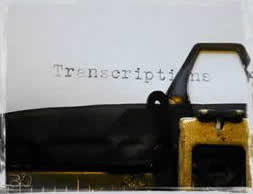
|
| 1.
Abstract |
The Transcriptions
Project and its associated Literature
and Culture of Information (LCI) undergraduate
specialization are seeking an Instructional Improvement
grant for two related initiatives that build on
the instructional technology and resources it
has created for the English Department. While
continuing to improve courses in the LCI specialization
itself, these initiatives are primarily designed
to bring the benefit of instructional technology
beyond "early adopters" to other courses
in the department:
- Coursebuilder Adoption Initiative:
Recently, Transcriptions completed for the English
Department a Coursebuilder
Web-site creation system, which is now being
used in a number of pilot courses. The Coursebuilder
Adoption Initiative will widen the use of the
system in the department through instructor
workshops, research-assistant support, and the
completion of documentation for the system.
This is a crucial step in the department's pedagogy
because an increasing number of English courses
are using online materials in their reading
assignments, student authoring assignments,
and in-class presentations. A significant number
of instructors have communicated a wish to use
Coursebuilder next year if the proper support
were available.
- Shared Online Teaching Resources
Initiative: The English Department has created
shared online instructional resources in its
technology-intensive centers. In addition, the
department has recently started digitizing and
putting online its more general repository of
print-based teaching materials for commonly
taught courses (including syllabi, teaching
notes, glossaries, historical guides, writing
guides, and other resources). The Shared Online
Teaching Resources Initiative will extend and
integrate this work by digitizing more print
materials; putting online new visual, video,
and audio materials requested by instructors;
and organizing the overall repository in a database
system. Several faculty teaching large courses
have communicated an interest in this initiative,
as have the coordinators of next year's English
Department TA Training Workshop (which will
include both the Coursebuilder Adoption Initiative
and Shared Online Teaching Resources Initiative
in its training).
Both the above initiatives would
be staffed by graduate student assistants supervised
by Profs. Alan Liu and Rita Raley through the
framework of the English Department's new Technology
Colloquium (English 593). The Colloquium, which
began in 2002-2003, is a combined technology and
skills development workshop in which Transcriptions
faculty supervise student assistants working on
the department's various digital projects.
|
| 2.
History & Context |
|
Beginning in 1998 when it received
a three-year grant for its Transcriptions Project
from the National Endowment for the Humanities
(supplemented by College of Letters & Science
and Instructional Improvement funding), the UCSB
English Department has emphasized the development
of information technology and its integration
in research and teaching. The characteristic pattern
of such development work has been for the several
new technology-intensive "centers" within
the department (the Transcriptions Project, the
Early Modern Center, and the American Cultures
Center) to create resources for their courses
and then to pass along the technology to the department
at large. As a result, the department is now known
as one of the nation's leaders in humanities computing.
Major projects accomplished since 1998 include:
- Transcriptions
Project ("Transcriptions: Literary
History and the Culture of Information"):
a research and curricular initiative in which
multiple faculty and graduate students designed
courses, research materials, colloquia, lab
facilities, and online resources devoted to
the thoughtful implementation of digital technology
in the humanities. Transcriptions has served
as the model for two new centers in the English
Department that make use of digital technology:
the Early
Modern Center and American
Cultures Center (recently renamed American
Cultures and Global Contexts)
- Literature
and Culture of Information (LCI) Undergraduate
Specialization: a curricular specialization
within the English major in which students take
at least four LCI courses from an average of
6-8 offered each year. LCI courses also enroll
other English majors as well as a wide spectrum
of students from other disciplines. In addition,
the LCI provides extracurricular learning opportunities—e.g.,
field trips to technology companies and classroom
visits by extramural speakers.
- Early
Modern Center Image Gallery: a database-driven
gallery of online study images of art, architecture,
and manuscript facsimiles from roughly 1580
to 1800 (restricted by password to instructional
use). The Image Gallery allows instructors to
use Web forms to build sequential or parallel
"slide shows." It is also searchable
and browseable in multiple ways, and includes
textual annotation. [Note: the Early Modern
Center is applying separately for Instructional
Improvement funding to complete, extend, and
widen the use of its Image Gallery.]
- English
Department Web Site and Database: one of
the nation's most content-rich and technically
advanced humanities department Web sites. The
site is driven by a database-to-Web system (using
SQL Server as the backend) that allows instructors
and staff to update content dynamically through
Web forms. Content is very deep on the site
and includes resources designed to make the
primary research and instructional activities
of the department visible.
- Related Digital Initiatives:
The English Department is the home of Voice
of the Shuttle, one of the oldest and best-known
humanities portals (recently converted into
a database-driven site) and also of the University
of California Digital
Cultures Project (a UC system-wide research
group headquartered at UCSB).
As a result of the above projects,
the English Department has created a lively and
expanding community of faculty and graduate students
working in humanities computing.
|
|
3. Proposal |
Transcriptions is asking for an Instructional
Improvement grant to help extend the English Department's
innovations in humanities computing in a direction
that benefits not only its own LCI courses but other
courses in the department. Transcriptions proposes
the following two complementary initiatives:
A.
Coursebuilder Adoption Initiative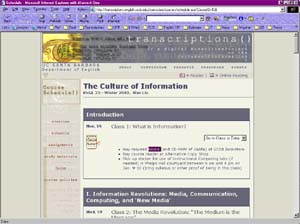
|
 Description of Coursebuilder:
Transcriptions has over the past two years developed
a Coursebuilder Web-site
creation system that can be generally used in
the English Department. The system combines Web
forms with a SQL Server database to allow instructors
without any knowledge of Web-authoring to create
and maintain online sites for their courses, ranging
at the instructor's discretion from simple sites
(with a syllabus and bibliography of print and
online materials) to full-featured sites (with
course overview, detailed schedule of readings,
description of assignments, bibliography, links
to class forums and student presentations, and
multiple class notes pages). After instructors
add or change information, the database dynamically
creates the actual course site and displays it
to the end-user in one of a number of templates
(or "skins") adapted to the needs of
the particular curricular unit that originated
the course. There are "skins" that duplicate
the look-and-feel of the general department site,
the Transcriptions site, the Early Modern Studies
site, and the American Cultures Center site. Unlike
commercially available course-Web systems, Coursebuilder
is fully integrated with the main English department
database so that course information that has been
entered by staff on the department site (e.g.,
enrollment codes, locations, times, office hours,
etc.) automatically show up in course sites, and,
reciprocally, a "publish" option in
Coursebuilder allows instructors to publicize
classes or specific course events (e.g., guest
appearances or film screenings) on the department's
online calendar and other parts of its Web site.
Description of Coursebuilder:
Transcriptions has over the past two years developed
a Coursebuilder Web-site
creation system that can be generally used in
the English Department. The system combines Web
forms with a SQL Server database to allow instructors
without any knowledge of Web-authoring to create
and maintain online sites for their courses, ranging
at the instructor's discretion from simple sites
(with a syllabus and bibliography of print and
online materials) to full-featured sites (with
course overview, detailed schedule of readings,
description of assignments, bibliography, links
to class forums and student presentations, and
multiple class notes pages). After instructors
add or change information, the database dynamically
creates the actual course site and displays it
to the end-user in one of a number of templates
(or "skins") adapted to the needs of
the particular curricular unit that originated
the course. There are "skins" that duplicate
the look-and-feel of the general department site,
the Transcriptions site, the Early Modern Studies
site, and the American Cultures Center site. Unlike
commercially available course-Web systems, Coursebuilder
is fully integrated with the main English department
database so that course information that has been
entered by staff on the department site (e.g.,
enrollment codes, locations, times, office hours,
etc.) automatically show up in course sites, and,
reciprocally, a "publish" option in
Coursebuilder allows instructors to publicize
classes or specific course events (e.g., guest
appearances or film screenings) on the department's
online calendar and other parts of its Web site.
The following are sample screen
shots of the Coursebuilder system. (Due to security
needs and the tight integration of Coursebuilder
with the English Department Web site, the system
is restricted through password protection to department
faculty and teaching assistants as well as faculty
affiliated with the department.)
Sample
Coursebuilder Editing Screens
(click on images for larger version)
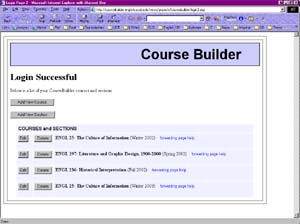 |
Coursebuilder login screen
Instructors see only the courses they manage.
(Shown are the four Coursebuilder courses
currently managed by Alan Liu.)
|
|
Course Overview building screen
After logging in and selecting either to
create or edit a course, instructors see
a version of this screen, where they can
give a description of the course and offer
other vital statistics, including information
about required texts. Basic course information
(times and locations, enrollment codes,
etc., are automatically supplied from the
central department database.) The "Publish
Option" allows instructors to make
the course and its events automatically
visible on the common department web site.
|
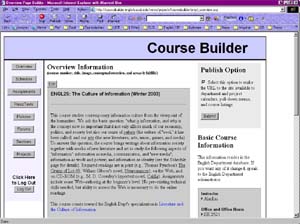
|
|
Coursebuilder schedule building screen
Instructors can create a schedule of readings
(a syllabus) with class titles, assigned
readings, links to class notes, and other
materials. Other Coursebuilder screens create
pages devoted to writing assignments, bibliographies,
class forums, and course policies.
|
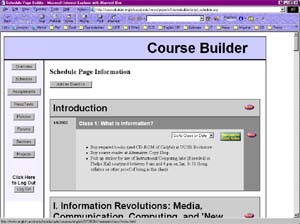
|
|
Typical Coursebuilder Web form editing
screen
Instructors use Web forms such as this
to enter information in the database tables
that undergird Coursebuilder. Special buttons
(invoking Javascript functions) allow ordinary
users to create basic HTML formatting effects
for their text. There are also provisions
for automatically inserting images.
|
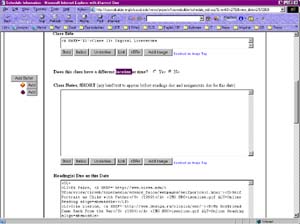
|
Sample
Coursebuilder "Skins" or End-User Views
(click on images for larger version)
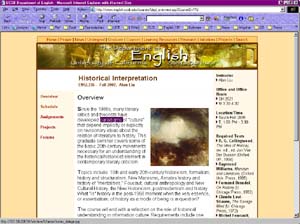 |
Coursebuilder "skin" for general
English Dept. use
Coursebuilder's database dynamically creates
Web sites based on a variety of front end
templates or "skins." Shown here
is the end-user's view of a course site
that has been formatted to fit within the
look-and-feel of the general English Department
Web site.
|
 |
Coursebuilder "skin" for Transcriptions
or LCI course
This is the end-user's view of a course
site that has been formatted for one of
the centers or projects within the English
Department (shown is a Transcriptions course).
|
|
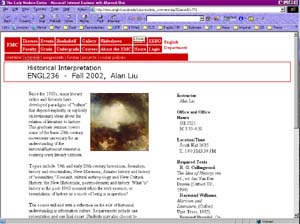
|
Coursebuilder "skin" for Early
Modern Center course
This is the end-user's view of a course
site that has been formatted for courses
taught by the English Department's Early
Modern Center.
|
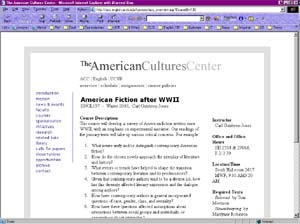 |
Coursebuilder "skin" for American
Cultures Center course
This is the end-user's view of a course
site that has been formatted for a course
taught by the English Department's American
Cultures Center.
|
 Current
and Projected Use of Coursebuilder:
At present, Coursebuilder is being used by a limited
number of technology "early adopters"
in the department. The following is a list of
course sites that have been created with Coursebuilder
during the development phase of the system:
Current
and Projected Use of Coursebuilder:
At present, Coursebuilder is being used by a limited
number of technology "early adopters"
in the department. The following is a list of
course sites that have been created with Coursebuilder
during the development phase of the system:
|
General Department Courses:
Transcriptions / LCI Courses:
Early Modern Center Courses:
American Cultures Center
Courses:
|
The goal of the Coursebuilder Adoption
Initiative is to broaden the use of Coursebuilder
to other instructors–especially those teaching
the majority of general English courses and those
in the department centers that have not yet tried
the system. This as a crucial step in the department's
pedagogy because an increasing number of English
courses–influenced both by interdisciplinary
approaches and information technology–are
using online materials in their reading assignments,
student authoring assignments, and in-class presentations.
Examples of such materials are the online readings,
multimedia materials, and student Web projects in
Transcriptions courses and the Early Modern Center's
online Image Gallery. Many of these materials could
not practically be made available in any other way.
Courses taught by Profs. Alan Liu and Rita Raley,
for example, regularly assign readings in online
texts, hypertext literature, dynamic "network
art," and other materials that are native to
the Internet ("born digital") and whose
URL's often have to be updated in the middle of
a teaching quarter. Prof. William Warner's courses
regularly assign viewings of online film, video,
and other multimedia clips. And Profs. Fumerton,
Pasternack, and others increasingly integrate in
their courses such materials as the Early English
Books Online database, visual materials from the
EMC Image Gallery and elsewhere, digitized manuscript
facsimiles, and audio materials (e.g., digitized
recordings of students reciting oral poetry). A
high priority of the English Department is to encourage
the majority of its instructors to create course
Web sites in order to take advantage of such online
materials and (through the Shared Online Teaching
Resources Initiative below) to share them. The department
believes that increasing the proportion of its courses
with rich online sites will have a payoff not only
for individual instructors, students, and courses
but for the department's overall public visibility
and thus its ability to recruit top students and
faculty.
Among
instructors who have not yet tried Coursebuilder
(or have so far only done so in a limited way),
the following have communicated a wish to use
the system to create course Web sites in 2003-2004
if the proper support were available (letters
from faculty available on request):
- Porter Abbott, English 21:
Introduction to Narrative (estimated enrollment:
200)
- Richard Helgerson, English
101: English Literature, Medieval to 1650 (est.
enrollment: 200)
- Patricia Fumerton, English
105A: Early Shakespeare (est. enrollment: 200)
- Shirley Lim, English 109: Writing
of Verse (est. enrollment: 35)
- Patricia Fumerton, English
197: Home and World: A Lowly Perspective (est.
enrollment: 15)
- Carl Gutiérrez-Jones,
English 134CH: History, Politics and Chicano
Culture (est. enrollment: 35)
- Carl Gutiérrez-Jones,
English 197: Post-WWII American Fiction (est.
enrollment: 15)
- Patricia Fumerton, English
231: Home and World: A Lowly Perspective (est.
enrollment: 15)
In addition, other instructors
who have created Coursebuilder sites in the past
(see list above)
have expressed a wish for support in extending
their use of the system and building fuller-featured
sites with additional kinds of materials.
 Requested Support and Work Plan (Budget
below): Transcriptions is requesting support
for graduate student research assistance during
Summer 2003, Fall 2003, and Winter 2004. Assistants
would perform the following tasks:
Requested Support and Work Plan (Budget
below): Transcriptions is requesting support
for graduate student research assistance during
Summer 2003, Fall 2003, and Winter 2004. Assistants
would perform the following tasks:
- Run a series of instructor
workshops on Coursebuilder. There will be
three general workshops for the department
during the year (one each quarter) and also
three more narrowly focused workshops designed
for the different centers within the English
Department (Early Modern Center, American
Cultures Center, Transcriptions Project).
- Set up the initial Coursebuilder
course site for instructors who might not
otherwise be coaxed to set up their first
course Web.
- Create online and print documentation
for the Coursebuilder system.
- Implement improvements in
the Coursebuilder Web forms and database structure
in response to instructor requests.
- Administer a questionnaire
that asks instructors using Coursebuilder
to evaluate the system and suggest improvements.
The questionnaire will be especially helpful
in identifying types of course work or classroom
activity not currently served by Coursebuilder.
Support is requested for Summer
through Winter quarters (instead of Fall through
Spring) because much of the work of building course
sites is done in the quarter before a teaching
quarter. (Coursebuilder work during Summer, for
example, will support teaching in Fall.)
B.
Shared Online Teaching Resources Initiative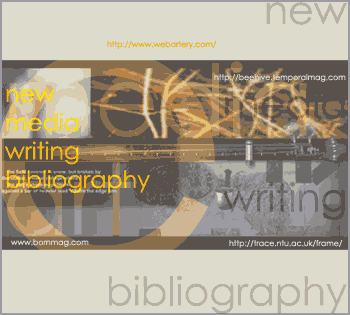
|
 Current and Projected Use of
Shared Online Teaching Resources:
Current and Projected Use of
Shared Online Teaching Resources:
In the past few years, the English
Department has developed shared online teaching
materials in two ways.
- High-Tech, Specialized Digitization:
The department's technology-intensive centers
(Transcriptions Project, Early Modern Center,
American Cultures Center) and their associated
curricular tracks have created a variety of
online resources that utilize the department's
database-to-Web system to allow instructors
to share teaching materials through sophisticated
interfaces. The site for the Transcriptions
Project, for example, makes available a suite
of teaching, learning, research, and technology
guides (Transcriptions:
Resources), guides to electronic literature
(Transcriptions:
Guide to E-Lit), and "mini-reviews"
of recent books used in courses (Transcriptions:
Bookshelf). Similarly, Early Modern Center
instructors make extensive shared use of their
Image Gallery (EMC:
Image Gallery) and online Bookshelf of recent
literature (EMC:
Bookshelf). In addition, the Early Modern
Center uses a special feature of the department's
Voice of the Shuttle database to create
a dynamic, shared set of annotated links to
Internet resources on the Renaissance and Eighteenth
Century (EMC:
Links). Courses organized by these centers
regularly draw upon these shared resources in
the construction of Coursebuilder-based syllabi
and assignments, classroom pedagogy, and student
presentations.
- Low-Tech, General Purpose
Digitization: In summer 2002, research assistants
working under the supervision of Transcriptions
upgraded the content of the English Department
Web site.
One of the projects begun during this upgrade
was the basic-level digitization (in PDF format)
and uploading of instructor's materials for
courses not associated with the technology-intensive
centers—especially required courses, lower-division
courses, and other bread-and-butter courses
in which instructors have traditionally shared
print-based syllabi, teaching notes, historical
or other contextual guidelines, glossaries of
terms, discussion questions, essay topics, writing
style guides, and other resources. The result
of the summer's work was the start of a general
purpose repository for courses on Milton, Restoration
and Eighteenth Century, Shakespeare, and Theory
(see http://www.english.ucsb.edu/grad/teaching/).
Several instructors teaching in large and mid-size
courses next year have communicated a wish for
Transcriptions to assist them in the further
development of such shared materials. In addition,
other faculty have expressed a wish that the
digitization of materials could be extended
to a larger variety of visual, audio, "born
digital," and other works. Examples of
instructors who have asked Transcriptions for
digitization assistance next year include (letters
available on request):
- Porter Abbott, English
21: Introduction to Narrative (estimated
enrollment: 200) (request for digitization
of pages from books, diagrams, images, some
video clips)
- Shirley Lim, English 109:
Writing of Verse (est. enrollment: 35)
- Rita Raley, English 146CN:
Contemporary Narrative Experiments (est.
enrollment: 35) (request for digitization
of visual, audio, and other multimedia material)
- Mark Maslan, English 103A:
American Literature, 1789-1900 (est. enrollment:
200) (request for digitization of textual
and visual material)
In addition, the chair of
the English Department's Undergraduate Program
has written a letter supporting this initiative
(Letters of Support:
Michael O'Connell); and the coordinators of
next year's TA Training Workshops have indicated
their intention of instructing new teaching
assistants in using both Coursebuilder and
shared resources (Letters
of Support: Marc Coronado and Cynthia
Davis).
The next logical step for the
department is not only to expand the variety and
amount of its online instructional materials but
to facilitate their sharing by integrating the
"high-tech" and "low-tech"
strategies of digitization described above. In
particular, Transcriptions will develop for the
department a common, searchable interface for
teaching materials that is accessible at all levels
of the department's Web (main Web site, center
and project sites, individual course sites) and
that is driven by a common underlying database-to-Web
system. The goal is to make resources created
for one class instantly available for use in other
classes. A repository of annotated links or a
bibliography of criticism designed for English
146CN (Contemporary Narrative Experiments) would
thus be available to English 21 (Introduction
to Narrative), and vice versa. So, too (to take
another example), courses would be able to draw
on the vast repository of annotated humanities
links in Voice of the Shuttle.
The long term goal of the Shared
Online Teaching Resources Initiative is to create
the critical mass of shared instructional materials
needed to foster not just increased collaboration
between instructors but new kinds of collaboration.
This initiative is complementary to the Coursebuilder
Adoption Initiative outlined above. Both are
motivated by the interdisciplinary trend in literary
studies that places a premium on using multimedia
and online materials in classes; and both can
be facilitated by using the department's database
to share content among numerous courses.
 Requested Support and Work Plan (Budget
below):
Requested Support and Work Plan (Budget
below):
Transcriptions is requesting
support for graduate-student research assistance
during Summer 2003, Fall 2003, and Winter 2004.
Assistants would work on the following tasks:
- Locate and digitize additional
print-based materials
- Add multimedia resources requested
by instructors (e.g., audio and video)
- Integrate the materials in
the English Department's database
- Develop an interface for the
repository that makes materials easily accessible
- Work on the database tables
and "middleware" code that allow resources
to be plugged dynamically into any of the department's
course pages. (The implementation of this feature
will follow the model of the department's existing
"Verso" backend system, which allows
Web page authors to drag-and-drop object-like
code modules onto a site from a common library
of such modules. These modules create the connection
strings and SQL queries that enable the dynamic
flow of information between the department database
and the Web.
- Administer a questionnaire
that surveys the way instructors and students
use shared online teaching materials. This questionnaire
will serve both to evaluate existing resources
and to diagnose areas where additional development
is needed.
Support is requested for Summer
through Winter quarters (instead of Fall through
Spring) because much of the work of building course
sites is done in the quarter before a teaching
quarter.
|
|
4. Project Supervision |
|
The Coursebuilder Adoption and
Shared Online Teaching Resources initiatives will
be supervised by Profs. Alan Liu and Rita Raley
of the Transcriptions Project through the framework
of the English Department's new Technology Colloquium
(English 593): a combined technology and skills
development workshop in which faculty supervise
student assistants working on the department's
various digital projects. The Colloquium meets
throughout the year to review ongoing work, plan
future work, and share skills (through skills
workshops devoted to such topics as "Implementing
Department Database Services on Course and Project
Web Sites"). The course enrolls the research
and teaching assistants involved in the department's
technology initiatives and centers.
Note on the Important Role
Played by Graduate Student Assistants in the Transcriptions
Project: Graduate student assistants in Transcriptions
have in the past acted as full partners in the
project. They sit on the project's planning and
design meetings, research content for the project's
Web site, collect background and critical resources
on the use of IT in teaching, design Web pages,
and help develop the project's software and networking
environments. Students who work on the project
develop expertise that complements their research
and teaching. (An increasing number of English
Department graduate students now work in areas
where their primary dissertation field includes
issues of information culture or technology.)
Because of the combination of technical and intellectual
necessary, recruiting excellent assistants for
Transcriptions is a high priority (see explanation
of budget below).
|
|
5. Budget |
|
Coursebuilder
Adoption Initiative
- Graduate Student Assistants
for 220 hours in Summer 2003 at $14.01/hr
(average of 20 hrs/wk) = $3,082
- Benefits for Summer Student
Assistants at 4.9% = $151
- Graduate Student Assistants
for 440 hours in Fall 2003 and Winter
2004 at $21.43/hr (average of 20 hrs/wk.)
= $9,430
- Benefits for Fall and
Winter Student Assistants at 4.9% = $462
Subtotal: $13,125
|
Shared
Online Teaching Resources Initiative
- Graduate Student Assistants
for 220 hours in Summer 2003 at $14.01/hr
(average of 20 hrs/wk) = $3,082
- Benefits for Summer Student
Assistants at 4.9% = $151
- Graduate Student Assistants
for 440 hours in Fall 2003 and Winter
2004 at $21.43/hr (average of 20 hrs/wk.)
= $9,430
- Benefits for Fall and
Winter Student Assistants at 4.9% = $462
Subtotal: $13,125
|
Explanation of Pay Rate and Pay Structure
for Graduate Student Assistants (SA's):
The hourly pay rate for academic-year student assistance
(as opposed to summer assistance) itemized above
is premised on the fact that Transcriptions/LCI
needs to recruit from the select group of graduate
students who have the right combination of literary
background and information-technology skills. In
the context of the English Department, this means
that there is no chance of recruiting capable student
assistants during F and W quarters unless Transcriptions
can compensate them at a level comparable to what
they would otherwise be earning as teaching assistants
in the English Department (All graduate students
in the English Department are guaranteed 4-5 years
of support at the level of a TAship. Students who
turn down a position with Transcriptions/LCI would
be guaranteed a regular TAship.) In previous years
when Transcriptions has received an Instructional
Improvement grant for SA's, therefore, the pay scale
during the academic year has matched that of the
English Department's TA's.
In addition to the base hourly rate, however, there
is also the issue of the benefits that TA's. receive
but that SA's normally do not. Based on a successful
paradigm it has previously applied to Transcriptions
grants received from Instructional Improvement (with
the approval of Instructional Improvement), the
English Department will close this gap by matching
SAships with a special portion of its general TA
funding. That portion will cover the supplementary
compensation needed to bring the total package offered
to a Transcriptions/LCI Student Assistant up to
a competitive level (including tuition remission
and health insurance).
In summary, the basic request is for Instructional
Development to provide a base salary rate that allows
Transcriptions/LCI to get into the ball park in
attracting high-skilled assistants. The English
Department will then match with supplementary funds
to bring the total compensation up to the necessary
level. This financial model was highly successful
during the initial phase of Transcriptions, and
Transcriptions/LCI would like to build upon it in
its present funding request. |
|
6. Appendices |
|
A. URL's for Web
Sites & Projects Cited in Proposal
English Department (Main Web
Site)
Transcriptions Project
Early Modern Center (EMC)
American Cultures Center (recently
renamed American Cultures& Global Contexts)
Voice of the Shuttle: Web Site
for Humanities Research
UC Digital Cultures Project
Coursebuilder
(restricted by password to English Department
instructors and affiliated faculty; please see
screen shots in proposal
above)
|
Example Course Sites
Created with Coursebuilder:
General Department Courses:
Transcriptions / LCI Courses:
Early Modern Center Courses:
American Cultures Center Courses:
|
B.
Letters of Support
(attached to print version of this proposal only)
Attached to the print version
of this proposal are letters of support from the
following:
- Carl Gutiérrez-Jones,
English Department Chair
- Prof. Michael O'Connell, chair
of Undergraduate program, English Department
- Graduate students Marc Coronado
and Cynthia Davis, English Department TA Coordinators
(in charge of TA Training Workshop)
As described above, individual
instructors have demonstrated a need for assistance
through one or both of the initiatives proposed
in this application. These letters (emails) are
not attached but can be made available on request.
|
|
|
|
|
|
|